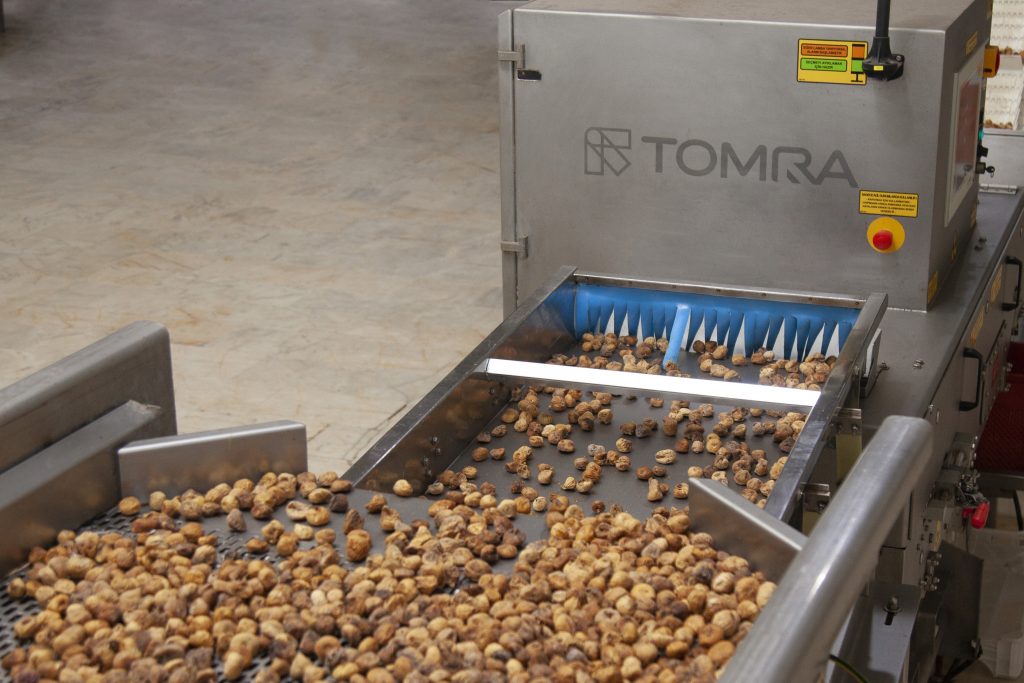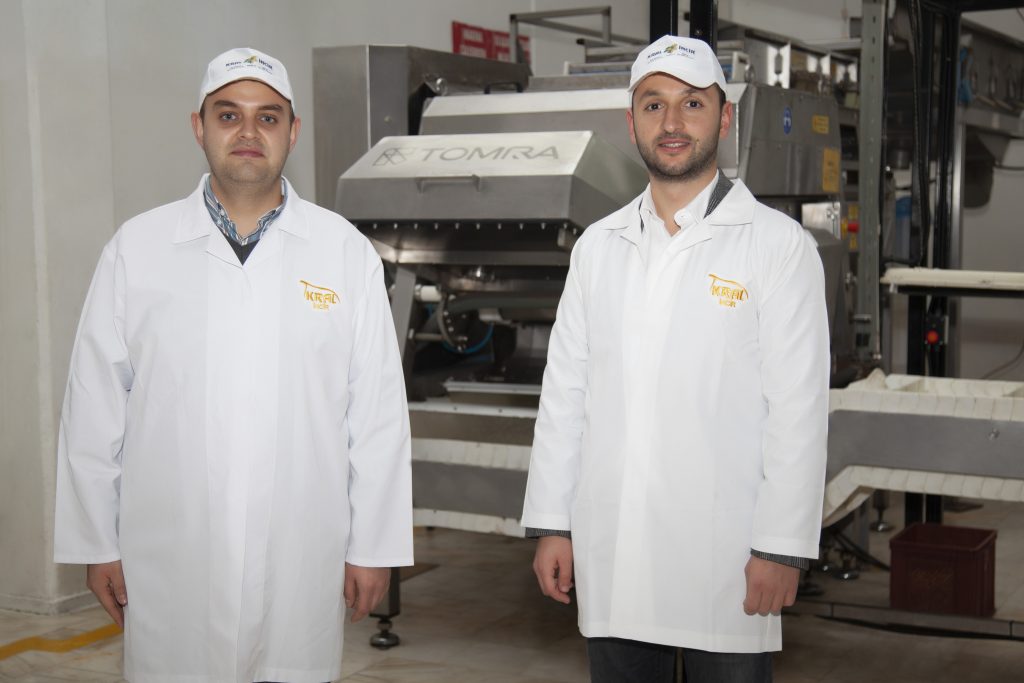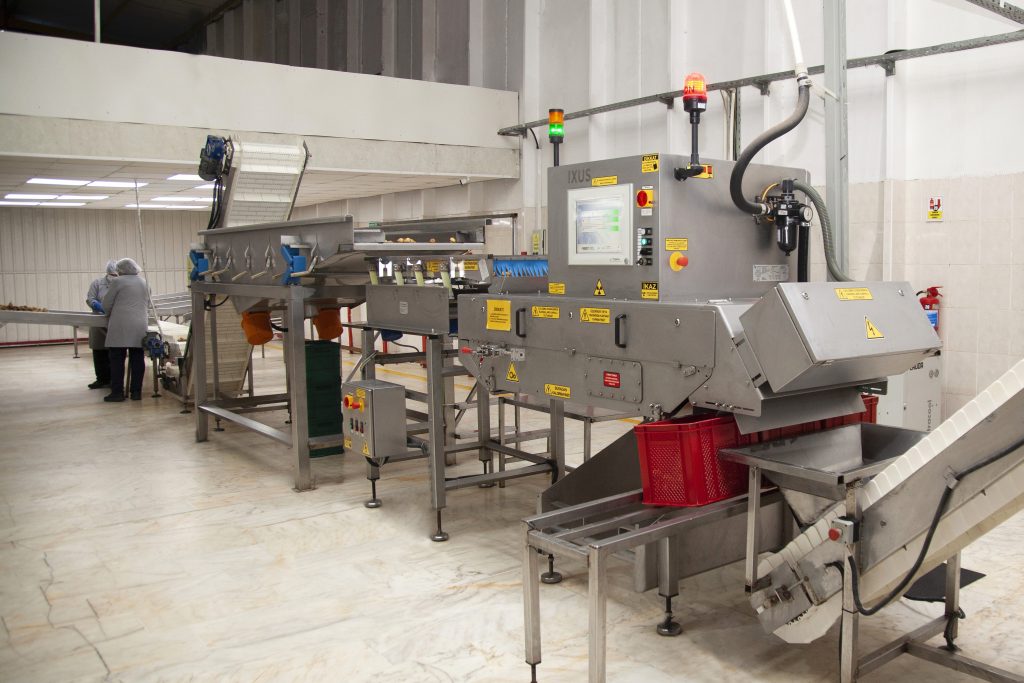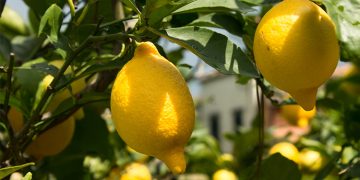Kral Incir’s origins date back to the 1950s and it started its operations in 1977 with fig trading. Its success in the field of dried figs, extending from its agricultural experience to exports, has enabled Kral Incir to become one of the most important fig exporters in Turkey along with its 4th generation management. Kral Incir carries out its production with the advantages of two TOMRA HELIUS and two TOMRA IXUS machines in the sorting processes.
Kral has an average of 6,000 tons of figs processing capacity annually at its facility in Nazilli Aydın. It has been offering its products to foreign markets for almost half a century under King Brand which first exported to Belgium in the mid-eighties. It exports 60 percent of its production, with the remaining 20 percent going to the domestic market. Kral exports to markets in European countries, especially France, Germany and Belgium, the United States and East Asia.
Although the production volume varies from year to year, over half of the world’s dried fig production, which is approximately 120 thousand tons annually, is supplied in Turkey. Alper Aksut, Kral Incir’s General Coordinator, stated that more than 60 percent of dried figs exported in the world markets are met by Turkey and added, “Turkey produces the highest quality figs and ranks first in the world’s dried fig production as well as its exports. The export volume of dried figs is about 300 million dollars in our country. Ideal climate conditions, our coasts having the Mediterranean climate and wind blowing from various directions throughout the day bring us a privileged position in fig production. We support these advantages with automation and sensor based sorting machines in processing the product thus enhancing our power in exports. Therefrom, TOMRA machines have enabled us to eliminate problems such as product defects, foreign materials and aflatoxin, so that we can offer our customers the best products.”
 Even though we’ve invested in technology in our plant, we still supply our products through traditional methods
Even though we’ve invested in technology in our plant, we still supply our products through traditional methods
Aksut emphasized that Aydın is the most suitable region in the world for the cultivation of figs and added, “80 percent of the figs produced in Turkey are grown in Aydın region and mostly dried figs are cultivated. 70 percent of the dried figs processed in Turkey are supplied from our region. The wind in the region provides for the homogeneous drying of the fig. And we obtain our products only from the farmers in our region at first hand.”
Dried fig is the most difficult to process and package compared to other dried fruit
Alper Aksüt mentioned that they offer dried fig products domestically and internationally for various uses from market chains to pharmaceutical industry in the form of industrial raw materials and packaged dried fruit and said, “Dried fig is the most difficult to process and package. The size and softness of a grain’s volume cause the fig’s shape to constantly change. We benefit from optical sorting machines to overcome such difficulties. TOMRA’s optical sorting machines help us a lot in sorting foreign materials and mycotoxin fractions.”
 Alper Aksut also underlined that the yield in production and product quality can vary from year to year and that 2021 was a challenging year in terms of product quality and said, “On the other hand, there is an increase in demand from year to year. We believe that the positive changing consumer demand in the domestic market and the interest in the healthy snack group will increase in the coming years. We hope that the demand will increase both in the domestic market and for export in the coming years, and that this demand will be met by the farmers and business owners that process and produce even higher quality products. We also observe great benefits of optical sorting machines in years when the quality of the yield is troublesome. Our TOMRA machines support us in ensuring the product’s food health safety in the most ideal way by sorting foreign materials and fractions containing mycotoxin while processing the raw material. Besides, they also speed up our production times to a great extent.”
Alper Aksut also underlined that the yield in production and product quality can vary from year to year and that 2021 was a challenging year in terms of product quality and said, “On the other hand, there is an increase in demand from year to year. We believe that the positive changing consumer demand in the domestic market and the interest in the healthy snack group will increase in the coming years. We hope that the demand will increase both in the domestic market and for export in the coming years, and that this demand will be met by the farmers and business owners that process and produce even higher quality products. We also observe great benefits of optical sorting machines in years when the quality of the yield is troublesome. Our TOMRA machines support us in ensuring the product’s food health safety in the most ideal way by sorting foreign materials and fractions containing mycotoxin while processing the raw material. Besides, they also speed up our production times to a great extent.”
Dried figs contribute immensely to the Turkish economy
Back at the end of the 1980’s, medium caliber dried figs were exported at around $1.5 to $2.0/kg. Today, they are exported between $5 and $6/kg. Aksut mentioned that the production of dried figs for the year 2021-2022 in Turkey was declared to be approximately 77,000 tons and added, “We estimate that this season 75 percent of our dried figs will be exported and 25 percent will be consumed in the domestic market. Turkey has been the world’s number one fig producer for the past five years’ average at 54% and Iran follows in the second place with a rate of 19%. While dried fig was demanded highly in export, it was still considered to be a luxury product in the domestic market and thus consumed less. However, due to the change in eating habits in recent years and the progressive trend towards healthy food products, dried fig consumption has also started to increase in the domestic market. In this respect, we hope that the annual consumption of 40 g/person, which is quite low, in our country will increase just as in Germany, which has an annual consumption of 190 g/person.”
Aflatoxin is formed in figs as well as in many other food products. In order to prevent the formation of aflatoxin in figs, the sorting processes should also be managed with immense care in addition to the cultivation and harvesting processes. Providing information on this subject, Aksut explained, “The fungi that cause aflatoxin in dried figs produce kojic acid. Kojic acid radiates in green-blue color in a dark environment under ultraviolet light. Figs with aflatoxin are sorted by taking advantage of this feature. Therefore, we perform the sorting of aflatoxin with TOMRA HELIUS under dark-room conditions. And we sort foreign materials such as glass, metal and stone with TOMRA IXUS.”
 We are delighted with after-sales services
We are delighted with after-sales services
We had initially preferred TOMRA because it produces very effective machines in the fresh and dried fruit industry for sorting processes. Not only have they offered highly innovative solutions for our industry, the after-sales service support we have received from TOMRA for the seven years we have used the machines has also increased our satisfaction.
TOMRA Food Turkey Sales Manager Ahmet Koçyiğit stated, “Dried figs hold a strategic importance in Turkey and it is necessary that we invest in product processing by keeping expectations about high quality in export in mind. It is important to sort key problems such as foreign materials, aflatoxin and quality defects. TOMRA’s industry-leading sensors ensure a clear view of every single product and any defects.”




















